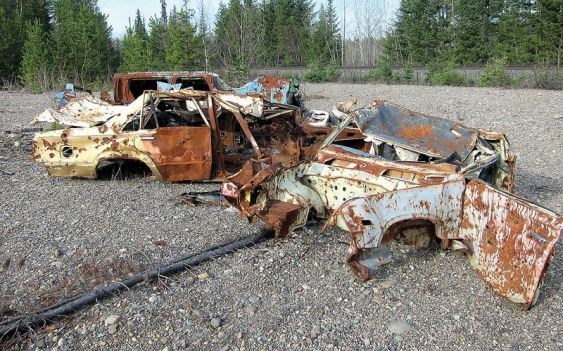Prince George has seen a steady increase in illegal dumping and it is the "single largest operational challenge," according to a staff report to city council.
Last year workers collected 29,670 kilograms of illegal waste, up almost 5,000 kilograms from the year before. In 2013 the city saw a peak of 53,590 kg after two years of 18,000 kg hauls in 2012 and 2011.
"Cleanup and removal of the debris is labour intensive, time consuming, and often expensive," said the report by Sean LeBrun, manager of Parks and Solid Waste. "Due to the types and size of materials being dumped, clean up of these sites often requires heavy equipment and large trucks."
In several sites, the city has installed gates, barricades and signs to try to reduce the dumping.
LeBrun pointed to Hoferkamp Road atop the cutbanks and behind the Hart scales on Blueberry Road as hot spots and Coun. Brian Skakun spoke to driving past a washing machine visible off Tyner Boulevard.
"I think the length that people go to to dump their garbage in the back roads and the trails in our community, it's just absolutely pathetic. I can't believe it," said Skakun at Monday night's council meeting.
"Some people are spending more money in gas than they would spending $6 to go to the transfer station."
Solid Waste Services has eight full time workers, including one foreman and seven truck drivers.
"We have no staff dedicated to cleaning up on illegal dumping. We rely on the public to report dump sites," LeBrun said.
According to a survey his department did, the public cares. The top three responses the residents thought should be a priority for waste management were illegal dumping and the link to service fees, large item collection and illegal dumping in general.
Skakun suggested the city set up a public reporting space, as other cities have done but asked LeBrun what else could be done to "curb and reduce illegal dumping other than shaming people."
"It's about education," said LuBrun. "Enforcement is a huge thing... I believe it's a very small group of people and I think if we actually started enforcing and convicting people it would make a huge difference."
Skakun also took objection to some critiques from the public that the city is at fault for charging fees at transfer stations. Both Vanway and Quinn Street transfer stations have been operated by the Regional District of Fraser Fort George since 2013.
"There is a cost to run solid waste and I think we went to $6 because there was a cost," Skakun said.
"If we make garbage free the ultimate loser are the folks who don't have garbage to throw away at all," added Coun. Jillian Merrick.
"We all end up using the service in the end and there's really no incentive to reduce the waste unless you're not having to pay for that disposal fee."
The city said it was working with the district to try and develop an illegal dumping strategy to map sites, organize clean-ups and improve reporting and bylaw enforcement.
The city's waste collection includes picking up office paper from 21 civic facilities as well as for 205 commercial, church and group home accounts.
LeBrun said the city is looking to change how it deals with commercial waste, which is estimated to take up 14 hours a week. The twice-a-week service is "time consuming, a workplace injury concern for staff, and a service that could be provided by one of the private sector waste haulers."
Since 2005, when the city first introduced curbside automated garbage collection, the city has changed how it does business.
At first the small trucks couldn't handle the volume, but those were replaced with bigger ones, capable of hauling twice the amount.
"The addition of these larger trucks has completely changed the way we do business," LeBrun said.
The 2010 initiative to have zero tolerance for overloaded carts has made the most difference. The report didn't yet have 2015 numbers for curbside recycling, which launched in September 2014 as a biweekly program.
Coun. Garth Frizzell asked if eliminating the $30 change fee for downsizing to smaller garbage cans has had any effect.
"It's been trivial," LeBrun said.
"We're 10 years now into this automated service. We are aware of what our family produces, how much we can divert. It's been negligible. The free downsizing really hasn't caused a stir like maybe anticipated."
The department is also considering a four day collection schedule, which would mean fuel savings and less calendar disruptions.



